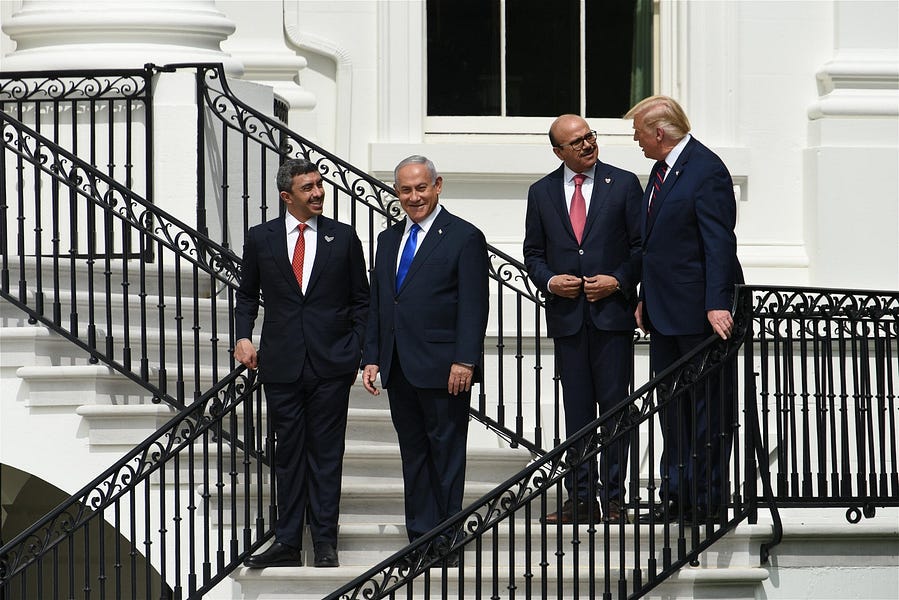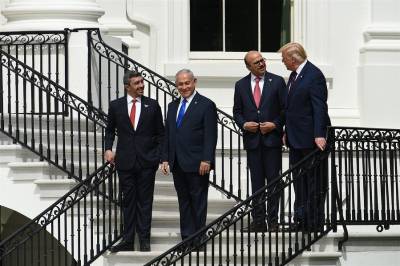When Donald Trump appointed his son-in-law Jared Kushner to the post of senior adviser and charged him with brokering Middle East peace, most of the veteran diplomats, scholars, and pundits who watch the region reacted with derision and disbelief. A vituperative blogger noted in 2017 that, “he is entirely in over his head and dangerously ignorant on policy matters.” Against the odds, however, Trump and the Kushner-led White House Middle East team have delivered a new era of peace in the Middle East. Would a Biden administration mean the end of the road for that era? Or could there be more good news ahead?
Few appreciate the break with history that the Trump administration’s Middle East policies represent. The conventional wisdom that guided generations of diplomats, experts, and leaders—that the road to Israeli-Arab peace is through Palestine; that recognizing Jerusalem as Israel’s capital will inflame the “Arab street”; that annexation will lead to war—have all proven wrong. The Arab world moved on, but the world of Arabists remained stubbornly mired in the same tropes that have animated it since 1967. Call it ignorance, call it groundbreaking—but there can be no denying that the Trump team achieved both historic changes and a fundamental realignment of the region. But much of this narrative appreciating Team Trump’s work ignores the pernicious role of the Obama administration in fueling that transformation.
Though they may not say it openly, the national security staff that walked in the door on the first days of the Obama presidency had a contrarian view about the Middle East. In their view, the U.S. focus on alliances with Sunni Arab powers had delivered little tangible progress against terrorists and dictators, and little peace. It was time for a Shiite-first policy, and though the vision initially faltered in the face of Iranian opposition, once at the table, the Islamic Republic and the Americans shared the hope that a revitalized U.S. relationship with the ayatollahs could drive deeper changes—though each likely had different views of what such a change might look like.
In addition, both the Obama administration and the Trump administration that followed had one clear imperative: no new wars in the Middle East. Of course, the region has a vote in international affairs, and in the turmoil of the Arab Spring, Obama joined a war to oust Libyan dictator Muammar Gaddafi. He also ultimately sent troops back to Iraq, into Syria, and to Yemen during his tenure. Trump, while less inclined to deploy boots on the ground, notably oversaw a joint U.K.-French-American bombing in response to Syrian dictator Bashar al-Assad’s use of chemical weapons, and ramped up (and then down) U.S. troop presence in many of the same countries as Obama.
But these were aberrations, as both Donald Trump and Barack Obama—not to mention American voters—voiced a desire to turn away from the problematic Middle East, and toward other priorities. Obama himself pointed out that the future would require Sunni Saudi Arabia and Shiite Iran to “share the neighborhood,” the implication being that the Pax Americana, such as it was, was over. Trump’s version—a Pax Israelitica of sorts—is also intended to pave Washington’s escape from the region. These professions of American uninterest after decades of intense engagement did not escape the notice of either America’s allies or its enemies.
The new-look Middle East—Sunni Arabs and Jews against Shiite Iran and its many proxies—is rooted in both of those Obama and Trump policies, but in the region, there are fears worse is to come. The election is weeks away, but Arab leaders are already fretting about what a Biden presidency could mean for them. More than the Biden-Harris campaign promises to “reassess our relationship with the Kingdom, end U.S. support for Saudi Arabia’s war in Yemen, and make sure America does not check its values at the door to sell arms or buy oil,” the greater fear is of the pendulum swinging back to the pre-Trump status quo, and a rebalancing of American policy in the region to favor Iran. As much as anything else, the fear of a renewed American-Iran alliance is driving Sunni Arabs to Israel. Could they be wrong?
Team Biden has made it clear that if Iran comes back into compliance with the Joint Comprehensive Plan of Action, or Iran deal, they will rejoin. But it seems unlikely that anyone from a Biden administration would conduct the aggressive lobbying campaign for Iran that Obama’s hapless Secretary of State John Kerry embraced. Indeed, the more serious risk is not that Biden’s Middle East advisers fall hopelessly in love with the Islamic Republic, as too many of Obama’s negotiators did. It is that they will do nothing in the face of Iranian efforts to dominate the Middle East and that America’s erstwhile allies take their security into their own hands, to dangerous effect.
With an America that ignores both Iranian predations against its own people and turns it back on supporting Washington’s traditional allies among Israel and the Sunnis, the odds are that regional powers will take it upon themselves to protect their interests in the best way they know how. That began with a new alliance with Jerusalem, but where it could end is anyone’s guess. The last time such fears were in the air, the Saudis escalated their conflict with Yemen, and began dabbling in opposition politics and worse in the neighborhood. This time they may well turn to other interested global players—Saudi Arabia is now China’s top oil supplier—for weapons and more.
In short, while a rekindling of the Democratic love affair with Tehran promises rough seas ahead in the Middle East, the larger problem may be that both a Trump second term or a Biden administration will likely wash their hands of the region, feeling that the mission as they defined it has been accomplished.
Photograph by Chen Mengtong/China News Service/Getty Images.






Please note that we at The Dispatch hold ourselves, our work, and our commenters to a higher standard than other places on the internet. We welcome comments that foster genuine debate or discussion—including comments critical of us or our work—but responses that include ad hominem attacks on fellow Dispatch members or are intended to stoke fear and anger may be moderated.
With your membership, you only have the ability to comment on The Morning Dispatch articles. Consider upgrading to join the conversation everywhere.